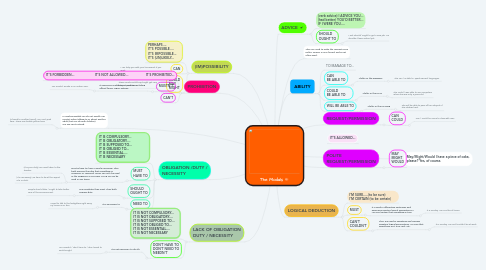
1. In Spoken English, we do not usually use mustn't when talking to or about another adult (but you do with children). We use can't instead.
1.1. (a friend to another friend): You can't park here. There are double yellow lines.
2. (IM)POSSIBILITY
2.1. PERHAPS.... IT'S POSSIBLE.... IT'S IMPOSSIBLE... IT'S (UN)LIKELY...
2.2. CAN
2.2.1. I can help you with your homework if you want.
2.3. COULD MAY MIGHT
2.3.1. These roads could/may/might get very busy at peak hours.
3. OBLIGATION /DUTY / NECESSITY
3.1. IT IS COMPULSORY... IT IS OBLIGATORY.... IT IS SUPPOSED TO... IT IS OBLIGED TO... IT IS ESSENTIAL.... IT IS NECESSARY
3.2. MUST HAVE TO
3.2.1. Must & have to: have a similar meaning. They both express the idea that something is necessary or required. MUST can only be used in the PRESENT or FUTURE. HAVE TO can be used in any tense.
3.2.1.1. (it is your duty) You must listen to the teacher.
3.2.1.2. (it is necessary) We have to be at the airport at 9 o'clock.
3.3. SHOULD OUGHT TO
3.3.1. Less emphatic than must. They both express duty.
3.3.1.1. People should take / ought to take better care of the ennvironment.
3.4. NEED TO
3.4.1. It is necessary to
3.4.1.1. I need to talk to the firefighters right away. My house is on fire!
4. LACK OF OBLIGATION DUTY / NECESSITY
4.1. IT IS NOT COMPULSORY... IT IS NOT OBLIGATORY.... IT IS NOT SUPPOSED TO... IT IS NOT OBLIGED TO... IT IS NOT ESSENTIAL.... IT IS NOT NECESSARY
4.2. DON'T HAVE TO DON'T NEED TO NEEDN'T
4.2.1. It is not necessary to do sth
4.2.1.1. You needn't / don't have to / don't need to work tonight.
5. PROHIBITION
5.1. IT'S FORBIDDEN... IT'S NOT ALLOWED... IT'S PROHIBITED...
5.2. MUSTN'T
5.2.1. It expresses prohibition in writing, including official forms, signs, notices.
5.2.1.1. You mustn't smoke in an indoor area.
5.3. CAN'T
6. May/Might/Would I have a piece of cake, please? Yes, of course.
7. They are used to make the request more polite. MIGHT is very formal and is not often used.
8. ADVICE
8.1. (verb advice) I ADVICE YOU... (had better) YOU'D BETTER... IF I WERE YOU....
8.2. SHOULD OUGHT TO
8.2.1. Mark should/ ought to get a new job. He shouldn't leave school yet.
9. ABILITY
9.1. TO MANAGE TO...
9.2. CAN BE ABLE TO
9.2.1. Ability in the PRESENT
9.2.1.1. She can / is able to speak several languages.
9.3. COULD BE ABLE TO
9.3.1. Ability in the PAST
9.3.1.1. She could / was able to use computers when she was only 5 years old.
9.4. WILL BE ABLE TO
9.4.1. Ability in the FUTURE
9.4.1.1. She will be able to pass all her subjects if she studies hard.
10. REQUEST/PERMISSION
10.1. CAN COULD
10.1.1. Can / Could he come to class with me?
11. POLITE REQUEST/PERMISSION
11.1. MAY MIGHT WOULD
12. LOGICAL DEDUCTION
12.1. I'M SURE.....(to be sure) I'M CERTAIN (to be certain)
12.2. MUST
12.2.1. It is used in affirmative sentences and expresses positive logical assumptions = I'm sure/certain that something is true.
12.2.1.1. It is Sunday. He must be at home.
12.3. CAN'T COULDN'T
12.3.1. They are used in negations and express negative logical assumptions. I'm sure that something isn't true, real, etc.
12.3.1.1. It is Sunday. He can't/couldn't be at work.

